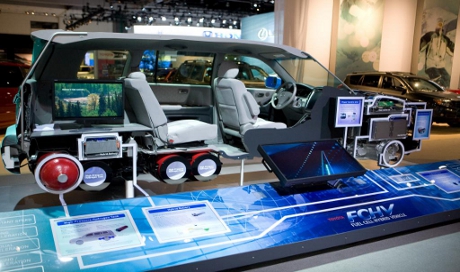
Toyota Motor Corp. is boosting its green vehicle lineup, with plans for 21 new hybrids in the next three years, a new electric car later this year and a fuel cell vehicle by 2015 in response to growing demand for fuel efficient and environmentally friendly driving.
Toyota said Monday it will offer an electric compact called eQ, based on its iQ model, in Japan and the U.S. in December though the number of the vehicles made will be extremely limited — about 100 for special fleet use, according to the company. The car, which will be called the iQ EV in the U.S, isl pricey at 3.6 million yen ($45,000) and has a limited cruise range of 100 kilometres (62 miles).
In the U.S., an electric version of the Rav-4 sport utility model, which Toyota worked on with U.S. electric vehicle maker Tesla Motors, goes on sale this month.
The fuel cell vehicle, which runs on hydrogen to produce electricity, will be offered from 2015. Details for that model were not released.
Like other Japanese automakers, Toyota is gearing up for expansion after getting battered the last few years by the financial crisis and disasters in northeastern Japan and Thailand that disrupted production.
The manufacturer is also counting on its reputation for green technology that it has built with its hit Prius, the world’s leading gas-electric hybrid, to woo buyers and fix its brand battered by the massive recall scandal in the U.S. a few years ago.
But rivals are working on green offerings, too, such as Nissan Motor Co. focusing on its Leaf electric car. Another challenge is that customers in emerging markets, which are driving growth in demand for autos, are still not as interested in hybrids and other fancy — and expensive — technology.
Takeshi Uchiyamada, the executive overseeing technology and new model development at Toyota, said the long-term potential for fuel cells was great, compared to electric cars, because of greater cruise range and shorter charging time. He said tens of thousands of fuel cell vehicles were likely to get sold in the 2020s.
A good compromise at the moment is the plug-in hybrid, which works as an electric vehicle until the battery runs down, and then switches to its hybrid motor, so there’s less chance of being stranded than with a standard electric car. Toyota has sold 15,600 of its plug-in vehicle since launching it earlier this year.
Uchiyamada said the positive reception for new technology, such as the hybrid, surprised Toyota, underlining the deep interest the public has in reducing emissions and protecting the environment.
Although annual hybrid sales were tiny when the Prius first went on sale in 1997, such sales have grown to more than one million a year worldwide, comprising 10 per cent of Toyota’s global sales.
In Japan, where green subsidies have been a big plus in recent years, hybrids make up nearly half Toyota’s sales, Uchiyamada, the engineer known as “the father of the Prius,” said.
“The public’s consciousness is a lot higher than we ever imagined,” he said.